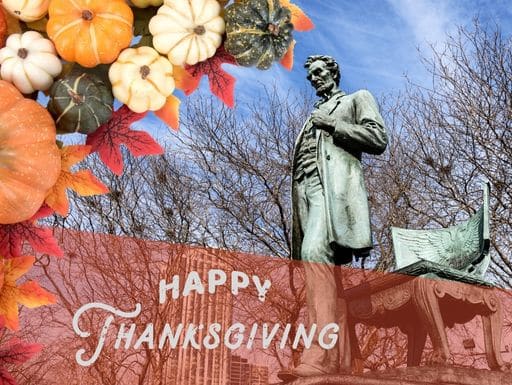
Below are the words of the Thanksgiving proclamation. I also add a few lines of commentary to show you how you can incorporate some of Lincoln’s techniques into your own speeches as well!
Transcript for President Abraham Lincoln’s Thanksgiving Proclamation from October 3, 1863
By the President of the United States
A Proclamation
The year that is drawing toward its close has been filled with the blessings of fruitful fields and healthful skies. To these bounties, which are so constantly enjoyed that we are prone to forget the source from which they come, others have been added, which are of so extraordinary a nature that they cannot fail to penetrate and even soften the heart which is habitually insensible to the ever-watchful providence of Almighty God.
In the midst of a civil war of unequaled magnitude and severity, which has sometimes seemed to foreign states to invite and provoke their aggressions, peace has been preserved with all nations, order has been maintained, the laws have been respected and obeyed, and harmony has prevailed everywhere, except in the theater of military conflict; while that theater has been greatly contracted by the advancing armies and navies of the Union.
Needful diversions of wealth and of strength from the fields of peaceful industry to the national defense have not arrested the plow, the shuttle, or the ship; the ax has enlarged the borders of our settlements, and the mines, as well of iron and coal as of the precious metals, have yielded even more abundantly than heretofore. Population has steadily increased, notwithstanding the waste that has been made in the camp, the siege, and the battlefield, and the country, rejoicing in the consciousness of augmented strength and vigor, is permitted to expect continuance of years with large increase of freedom.
No human counsel hath devised, nor hath any mortal hand worked out these great things. They are the gracious gifts of the Most High God, who while dealing with us in anger for our sins, hath nevertheless remembered mercy.
It has seemed to me fit and proper that they should be solemnly, reverently, and gratefully acknowledged as with one heart and one voice by the whole American people. I do, therefore, invite my fellow-citizens in every part of the United States, and also those who are at sea and those who are sojourning in foreign lands, to set apart and observe the last Thursday of November next as a Day of Thanksgiving and Praise to our beneficent Father who dwelleth in the heavens. And I recommend to them that, while offering up the ascriptions justly due to Him for such singular deliverances and blessings, they do also, with humble penitence for our national perverseness and disobedience, commend to His tender care all those who have become widows, orphans, mourners, or sufferers in the lamentable civil strife in which we are unavoidably engaged, and fervently implore the interposition of the Almighty hand to heal the wounds of the nation, and to restore it, as soon as may be consistent with the Divine purposes, to the full enjoyment of peace, harmony, tranquility, and union.
In testimony whereof, I have hereunto set my hand and caused the seal of the United States to be affixed.
Done at the city of Washington, this third day of October, in the year of our Lord one thousand eight hundred and sixty-three, and of the Independence of the United States the eighty-eighth.
Abraham Lincoln
By the President: William H. Seward. Secretary of State.
Commentary on Abe Lincoln’s Thanksgiving Proclamation.
Lincoln uses the first paragraph to build rapport with the audience. Instead of focusing on what divided the country, he focused on the positive to gain agreement. Then in the second paragraph, he does something that many modern-day politicians try to copy. He subtly uses ego and patriotism to build commonality while downplaying the negative.
He is basically saying, except for this “civil war thing,” everything is fine. To be honest, I’m really not sure if this paragraph of the speech worked effectively. It is possible that people today see this part of the speech and think, “If Lincoln could do it, maybe I can do it too.”
I just have to think that when he is talking about how “peace has been preserved” and “harmony has prevailed everywhere” to a woman who has lost both a husband and a son to the war, his words likely antagonized versus brought harmony.
After the Obligatory Civil War Comment, He Again Rebuilds Rapport.
However, in the next section, he rebuilds the rapport again. He focuses on the growth that has occurred in the nation — even during the war. He ends that section by saying that this growth will increase even more as new freedom is created. By mentioning the different industries, he is speaking to the population who participates in those industries.
He finishes by saying that this growth and success are a gift from God. And that it is our duty to remember that on a day of Thanksgiving.
Abraham Lincoln’s Thanksgiving Proclamation is not one of Lincoln’s most quoted speeches. However, if you look at how he presented his ideas, we can learn from it. Even when you know that a lot of the listeners may not agree with you, focus on the things that you can agree on. If you have to add in content that is controversial, deliver it with compassion.
In then, if that doesn’t work, bring up a live turkey and pardon it.

